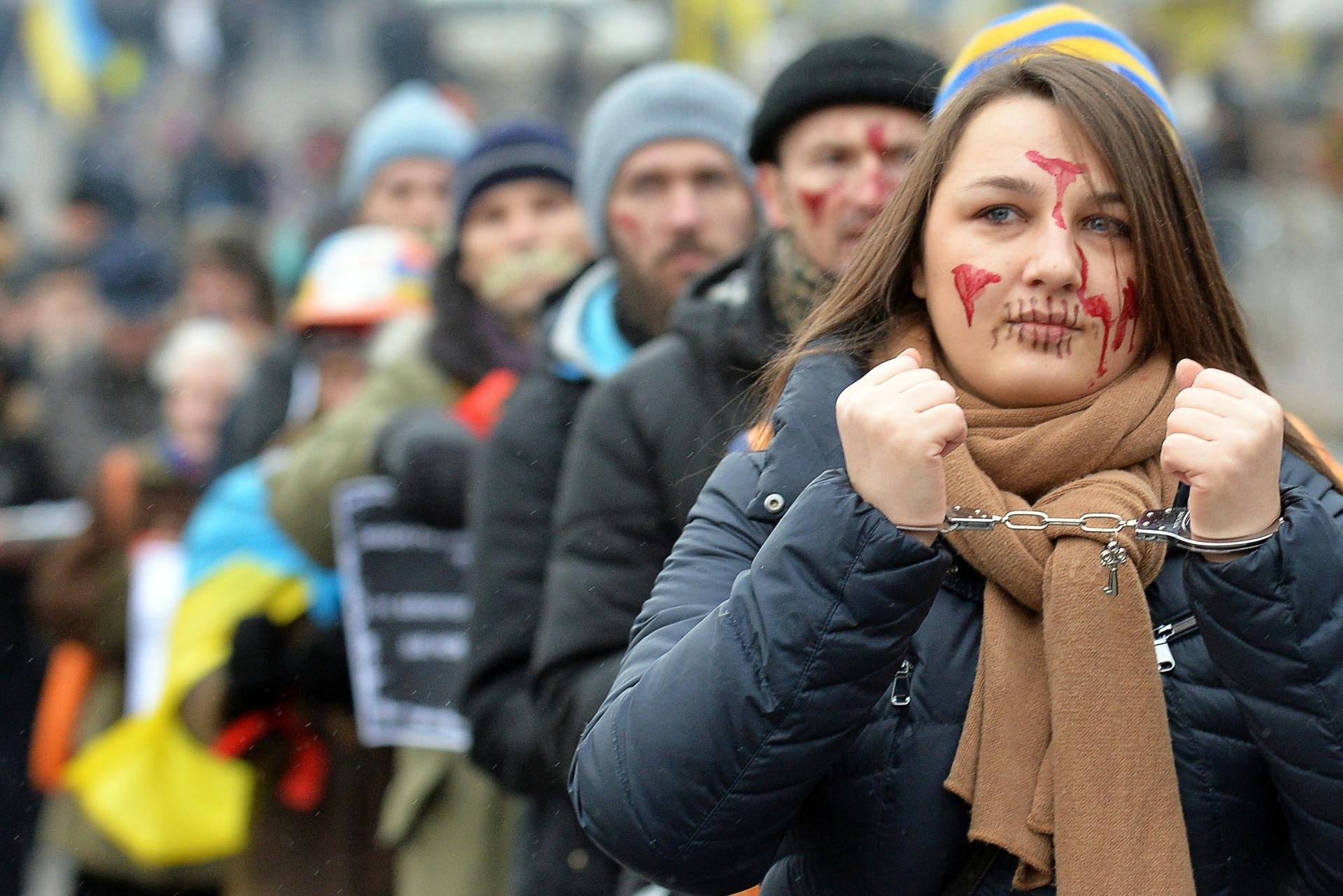Raise your hand if you want dictatorship!
Pro-European activists protest outside the president’s office in Kyiv, Ukraine.
MOSCOW, Russia — There have been cleverer ways of maneuvering controversial laws through parliament, but Ukraine apparently prefers it quick and dirty.
By a dubious show of hands, the country’s parliament on Thursday rammed through a package of draconian draft laws that have alarmed both Western officials and domestic activists who say the move amounts to a broad crackdown on civic freedoms aimed at punishing the protesters who have crowded the streets of Kyiv since last November.
Critics have accused members of President Viktor Yanukovych’s ruling Party of Regions of violating parliamentary procedure to force through legislation that would effectively outlaw staging protests without permission, criminalize libel and levy a batch of new restrictions on media outlets and NGOs.
One of the most striking is a measure that requires Ukrainian NGOs that receive funding from abroad to register as “foreign agents,” which mirrors similar Russian legislation passed during a crackdown against the opposition following President Vladimir Putin’s return to the presidency in 2012.
The Ukrainian bills arrive as the Euromaidan (“Eurosquare”) street protest prepares to mark its second month amid the most serious political crisis in Ukraine since the 2004 Orange Revolution.
Protesters have called for ousting both Yanukovych and his government for refusing to pull Ukraine closer to Europe and violently cracking down on mostly peaceful protests.
But the authorities have ceded little ground.
The latest move represents the government’s sternest attempt yet at ending a protest movement that has fluctuated in size but remains a constant presence in the capital.
Among other restrictions, the legislation also forbids blocking access to private property, driving in a column of more than five cars, and investigating police officials and judges — all tactics protesters and activists have used in recent weeks.
The punishment for the various offenses ranges from hefty fines to prison sentences of up to six years.
The procedure for stripping lawmakers’ immunity has also been simplified, a move critics say could be used to punish opposition deputies who have played a leading role in the demonstrations.
On Friday, Catherine Ashton, the EU’s top diplomat, said in a statement that the “regrettable developments” are “contrary to Ukraine’s international obligations.”
Her comments came a day after the US State Department expressed “serious doubt” over the country’s “commitment to democratic norms.”
Volodymyr Fesenko, a political analyst in Kyiv, told local media the Ukrainian authorities are seeking a “Belarusian scenario,” referring to Ukraine’s authoritarian northern neighbor, whose president, Alyaksandr Lukashenka, has ruled for nearly two decades.
But pro-government officials in Ukraine insist most of the measures are necessary to restore order in a political crisis that has kept the streets of the capital gridlocked and angered masses of Ukrainians who prefer closer ties with Moscow over European integration.
More from GlobalPost: Spaniards try to sew up economic recovery
Vadym Kolesnichenko, one of the bills’ authors, deflected criticism about a sudden crackdown, telling GlobalPost he had been working on some of the measures for the past three years.
He says the apparent anti-protest measures — which include the prohibition of helmets and masks during protests and the outlawing of “extremist” material — are aimed at weeding out the radical elements he says have infiltrated the protests.
“The authorities are responsible for protecting not only the participants of a peaceful demonstration,” he said, “but also other people who are not represented by those political forces and don’t subscribe to the same views.”
He says the other measures — such as the criminalization of libel and the foreign agent stipulation — are similar to American and European legislation already in force.
The bills still require Yanukovych’s signature to become law. Although some Ukrainian media have reported he’s already signed them, there was no official confirmation on his website Friday.
Our coverage reaches millions each week, but only a small fraction of listeners contribute to sustain our program. We still need 224 more people to donate $100 or $10/monthly to unlock our $67,000 match. Will you help us get there today?
